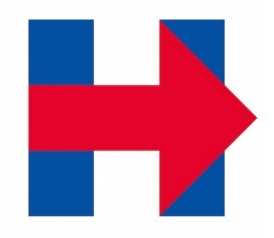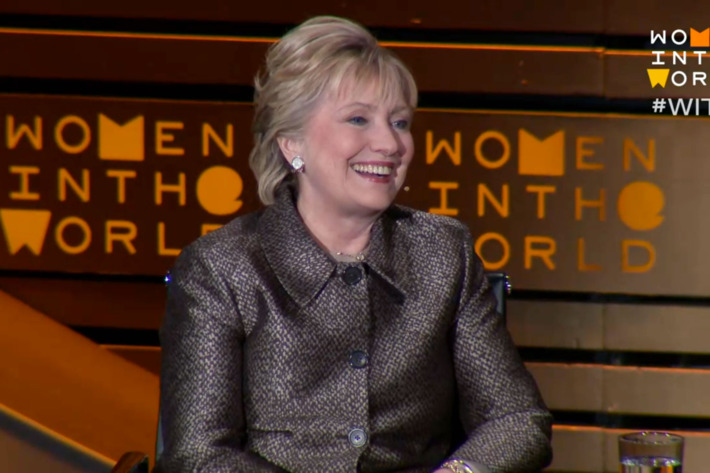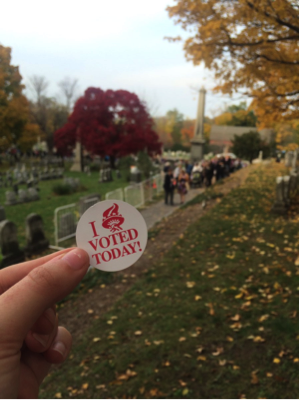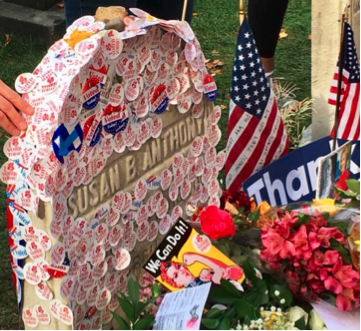
On Saturday, Hillary for America responded to the revelation that the FBI has found “additional evidence” related to Hillary Clinton’s email with a call for more information from the FBI and Director James Comey. Campaign Chair John Podesta and Manager Robby Mook held a press phone briefing earlier today. A transcript of their comments is below:
CAMPAIGN CHAIR JOHN PODESTA: The extraordinary letter that was long on innuendo and short on facts that Director Comey sent yesterday to eight Republican committee chairs. Twenty-four hours after that letter was sent, we have no real explanation of why Director Comey decided to send that letter to congressional leaders. In fact, the more information that has come out, the more overblown this all seems, and the more concern it creates about Director Comey’s actions. For starters, it seems clear that some of initial characterizations of the FBI’s actions were inaccurate, despite initial reporting that the letter amounted to the quote, unquote, “Reopening of the investigation concluded last July.” It seems that that is not at all the case. That notion was pushed of course was by Congressman Jason Chaffetz.
It is not surprising that Congressman Chaffetz would take the opportunity to distort the facts to mount an attack on Hillary Clinton. This is someone who has promised to launch years of new Hillary Clinton investigations when she is president. Even conservative columnist Jennifer Rubin, and said earlier this week that Chaffetz says undermined his own legitimacy and he was – that he was “obsessed with finding something, anything to hang around Hillary Clinton’s neck.” So while some initially ran with the notion that an investigation was being reopened, those were Chaffetz’s words, not Comey’s, and outlets have already walked back this claim.
But this is exactly the problem that Director Comey has created with sending off his letter just 11 days out from the presidential election. By providing selective information, he has allowed partisans to distort and exaggerate in order to inflict maximum political damage, and no one can separate what is true from what is not because Comey is not been forthcoming with the facts. What little Comey has told us makes it hard to understand why this step has been warranted at all. For instance, he says, quote, “The FBI cannot assess whether or not this material may even be significant,” unquote.
And the reporting that has surfaced in the hour since this letter surfaced create even more confusion why Comey would have raised this on the eve of the election. NBC has reported from law enforcement sources that the emails in question were never withheld by Hillary Clinton or the Clinton campaign. NBC reported that the emails in question did not come from Clinton’s server at all. That has now been corroborated by a slew of other news outlets, and according to the Los Angeles Times, Clinton did not even personally or receive any of the emails in question.
Reports indicate that many of these emails are likely duplicates of ones that have already been turned over and reviewed by the bureau and its investigation last July. It is in fact entirely possible all the emails in question are just that, duplicates. So that is what we have learned from reporting in the wake of Director Comey’s message to congressional leaders. So just to recap and to put this in perspective, there is no evidence of wrong doing, no charge of wrong doing, no indication that this is even about Hillary. In fact, there are reports that the emails they want to look at are duplicates of things they already have and aren’t even from or to Hillary.
Even Director Comey said, “This may not be significant.” If that is all true, it is hard to see how this amounts to anything, and we are not going to be distracted, and Hillary is not going to be distracted in the final days of this election over nothing. But we should not be forced to get this information from second and third hand sources, from leaks, from law enforcement and FBI sources, Director Comey was the one who decided to take this unprecedented step. We now learned against the advice of senior Justice Department officials, who told him it was against long-standing department policy from Democratic and Republican administrations. Director Comey was the one who wrote a letter that was light on facts, heavy on innuendo, knowing full well what Republicans in Congress would do with it. It’s now up to him, who owes the public answers to the questions that are now on the table, and we’re calling on him to come forward and give those answers to the American public. So with that, let me turn it over to our campaign manager, Robby Mook.
CAMPAIGN MANAGER ROBBY MOOK: Well, thank you John, and this is a very concerning situation. As John explained, the more information that comes out, the more overblown this entire situation seems to be. That, in turn, has raised more questions about Director Comey from his colleagues in law enforcement circles to take this extraordinary step 11 days out from the presidential election. Just this morning, there is a startling report in the Washington Post saying that senior Justice Department officials warned Director Comey not to do this and that it was inconsistent with the practices of the department. He was apparently told that “we do not comment on an ongoing investigation, and we don’t take steps that will be viewed as influencing an election,” according to one Justice official who spoke to the Post. As a result of this, Comey has come under considerable pressure from not just Democrats but also Republicans and legal experts alike.
The Washington Post amplifies this point. Former Assistant U.S. Attorney Nick Akerman says, “Director Comey acted totally inappropriately. He has no business writing to Congress about supposed new emails that neither he nor anyone in the FBI had ever reviewed. It is not the function of the FBI director to be making public pronouncements about an investigation, never mind about an investigation based on evidence that he acknowledges may not be significant.”
Also former federal prosecutor Peter Zeidenberg said he respects Comey, however, quote, “I don’t understand this idea of dropping this bombshell, which could be a big dud. Doing it in the last week or 10 days of a presidential election without more information, I don’t think that he, I don’t think he should because how does it inform voters? It just invites speculation.” And in addition, former Justice Department spokesperson, Matt Miller, said, “The Justice Department’s long-time, long-standing practice is ‘don’t do anything seen as trying to influence an election.’ That’s usually interpreted as 60 days, let alone 11. It’s completely unfair to Secretary Clinton, and it’s really unfair to the voters. There’s no reason he had to send this letter.”
And finally, according to reports, Attorney General Loretta Lynch “expressed her preference that Comey follow the department’s long-standing practice of not commenting on ongoing investigations and not taking any action that could influence the outcome of an election,” but he said he felt compelled to do otherwise. So as John said, “It’s now incumbent on Director Comey to immediately provide the American people with more information than what is contained in his letter.” He owes the public the whole story, or else he shouldn’t have cracked open this door in the first place. Both campaigns and leaders in both parties of Congress are in full agreement on this fact.
And the last thing I’d say before I turn it back to Brian is that based on the anecdotes I’m hearing from our team on the ground, this situation has created an urgency, an intensity among our volunteers and activists that was already high because we are so close to the election but that our volunteers are rallying behind Hillary. They know what a fighter she is. I think they were heartened that she came out and addressed this so forthrightly, that she is calling for the full story to be told. And they’re as upset and concerned as we are here, and they are turning out, not only to have her back but to rally our supporters to turn out and vote as early voting goes into full swing. And we’re not just seeing this in our offices on the ground, but also in our, in our online, in the online space as well. And the, I think this is, we already had momentum and wind behind our back going into yesterday. I think this has only increased the momentum that we’re feeling among our activists on the ground.
In addition, HFA released two briefs featuring articles and coverage from the press showing that as more details have been released, the less significant the evidence appears. The releases are below:
Comey Under Fire After Sending Unprecedented Letter
FBI Director James Comey is under widespread criticism for breaking department precedent by commenting on an ongoing investigation, and doing so just days before a presidential election. Indeed, the Washington Post reported this morning senior Justice Department officials made perfectly clear to Comey that he would be in violation of long-standing DOJ policy.
Moreover, according to CNN, Attorney General Loretta Lynch and Deputy Attorney General Sally Yates both objected to Comey sending this inappropriate letter to Congress. Nevertheless, Director Comey independently decided to move forward, rattling the presidential election with a note that was heavy on innuendo and extremely light on actual information or needed details.
The result? Broad bipartisan condemnation and demands for the swift disclosure of more information:
Washington Post: Justice officials warned FBI that Comey’s decision to update Congress was not consistent with department policy: “Senior Justice Department officials warned the FBI that Director James B. Comey’s decision to notify Congress about renewing the investigation into Hillary Clinton’s private email server was not consistent with long-standing practices of the department, according to officials familiar with the discussions. Comey told Justice Department officials that he intended to inform lawmakers of newly discovered emails. These officials told him the department’s position “that we don’t comment on an ongoing investigation. And we don’t take steps that will be viewed as influencing an election,” said one Justice Department official who spoke on the condition of anonymity to describe the high-level conversations.”
CNN: Comey notified Congress of email probe despite DOJ concerns: “Attorney General Loretta Lynch and Deputy Attorney General Sally Yates objected to FBI Director James Comey’s decision to notify Congress about his bureau’s review of emails related to Hillary Clinton’s personal server, law enforcement officials familiar with the discussion said. Comey decided to disregard their objections and sent the letter Friday anyway, shaking the presidential race 11 days before the election and nearly four months after the FBI chief said he wouldn’t recommend criminal charges over the Democratic nominee’s use of the server.
New York Times: Justice Dept. Strongly Discouraged Comey on Move in Clinton Email Case: “Mr. Comey’s letter opened him up to criticism not only from Democrats but also from current and former officials at the F.B.I. and the Justice Department, including Republicans. ‘There’s a longstanding policy of not doing anything that could influence an election,’ said George J. Terwilliger III, a deputy attorney general under the first President George Bush. ‘Those guidelines exist for a reason. Sometimes that makes for hard decisions. But bypassing them has consequences.’”
Politico: Comey’s disclosure shocks former prosecutors: “James Comey’s surprise announcement that investigators are examining new evidence in the probe of Hillary Clinton’s email server put the FBI director back under a harsh spotlight, reigniting criticism of his unusual decision to discuss the high-profile case in front of the media and two congressional committees.”
Los Angeles Times: “The emails were not to or from Clinton, and contained information that appeared to be more of what agents had already uncovered, the official said, but in an abundance of caution, they felt they needed to further scrutinize them.
Washington Post Editorial: The damage Comey’s bad timing could do: “Mr. Podesta said he is ‘confident’ full disclosure ‘will not produce any conclusions different from the one the FBI reached in July.’ If so, the question will be how badly damaged was Ms. Clinton’s candidacy by the 11th-hour re-eruption of a controversy that never should have generated so much suspicion or accusation in the first place.”
New York Times Editorial: “But Mr. Comey’s failure to provide any specifics about a new, potentially important development, less than two weeks before Election Day, is confounding. As Mr. Comey put it in July: “The American people deserve those details in a case of intense public interest.” They deserve details even more urgently today.”
Bloomberg: FBI Shocker on Clinton Fuels Criticism of Comey’s Tactics: “FBI Director James Comey is facing extraordinary pressure to explain himself after dropping a bombshell on the campaign of Hillary Clinton just 11 days before the presidential election… Former prosecutors and lawmakers from both parties expressed shock and dismay at Comey’s highly unusual decision, which flouted decades of legal custom that call for avoiding taking actions that could affect the outcome of an election.”
Washington Post: FBI Director James B. Comey under fire for his controversial decision on the Clinton email inquiry: “Nick Ackerman, a former federal prosecutor in New York and an assistant special Watergate prosecutor, said Comey ‘had no business writing to Congress about supposed new emails that neither he nor anyone in the FBI has ever reviewed.’”
Huffington Post: News Outlets Dial Back Reports Of FBI ‘Reopening’ Clinton Email Case: “The story took several other turns on Friday afternoon that complicated the early, screaming headlines, and then ensured the story would remain a topic of discussion in the days ahead. Multiple outlets subsequently reported that the new emails weren’t sent by Clinton and didn’t come from her private server.”
CNN Legal Analyst, Paul Callan: Time for FBI director Comey to go: “Comey’s public announcement in July that the FBI had concluded its investigation regarding Hillary Clinton’s use of a private email server in the conduct of official State Department business and would not recommend the lodging of criminal charges was historically unprecedented in a high-profile political case.”
Washington Post Op-Ed by Former DOJ Spokesman Matt Miller: James Comey fails to follow Justice Department rules yet again: “With each step, Comey moved further away from department guidelines and precedents, culminating in Friday’s letter to Congress. This letter not only violated Justice rules on commenting on ongoing investigations but also flew in the face of years of precedent about how to handle sensitive cases as Election Day nears…. The director of the FBI has great power at his disposal…. With that independence comes a responsibility to adhere to the rules that protect the rights of those whom the FBI investigates. Comey has failed that standard repeatedly in his handling of the Clinton investigation.”
New York Times: F.B.I. Chief James Comey Is in Political Crossfire Again Over Emails: “The reaction was swift and damning, with Mrs. Clinton’s supporters and even some Republicans blasting Mr. Comey. Indeed, Mr. Comey, who was attacked this summer by Democrats and Republicans for both his decision not to bring charges against Mrs. Clinton and for the way he handled it, found himself in an even stronger crossfire on Friday.”
Los Angeles Times’ Michael McGough: FBI director should have known what his Clinton emails letter would unleash: “Having raised new doubts about Clinton so close to an election, Comey has an obligation —a moral obligation if not a legal one — to do everything he can to expedite the “additional work” required to determine whether this new information does, in fact, cast doubt on his earlier conclusion that Clinton wasn’t criminally culpable.”
Aurora Sentinel Editorial: FBI’s Comey needs to come clean on details, motivation — or resign: “If there’s damning or critical information about Clinton staff handling of email that creates the clear and immediate threat to national security that would warrant such a ploy, Americans deserve to have Clinton explain them, and Clinton must get that opportunity. Otherwise, Comey needs to apologize for his infelicity and possibly politically motivated stunt, and immediately step aside.”
Newsweek: Hillary Clinton’s Emails: The Real Reason The FBI Is Reviewing More Of Them: “Unfortunately, by trying to have things both ways – revealing the change in circumstances while remaining vague about what the agents know – Comey has created that misleading impression that could change the outcome of a presidential election, an act that, if uncorrected, will undoubtedly go down as one of the darkest moments in the bureau’s history.”
New Yorker: James Comey Broke With Loretta Lynch And Justice Department Tradition: “Coming less than two weeks before the Presidential election, Comey’s decision to make public new evidence that may raise additional legal questions about Clinton was contrary to the views of the Attorney General, according to a well-informed Administration official. Lynch expressed her preference that Comey follow the department’s longstanding practice of not commenting on ongoing investigations, and not taking any action that could influence the outcome of an election, but he said that he felt compelled to do otherwise.”
Charlotte Observer Editorial: Comey drops Hillary Clinton email bombshell; so tell us more: “But it is extraordinary for such volatile information to emerge so close to Election Day and that’s especially true given how few specifics are known. Because Comey was so vague, voters can’t know what to think. The new emails could be anything from meaningless to evidence of criminal activity by Clinton to most anything in between.”
ThinkProgress: The ‘new’ Clinton emails might all be duplicates: “So, to be clear, the FBI Director delivered a gut punch to the Clinton campaign, despite the fact that 1) he doesn’t know what he has; 2) it may be something that he already had; and, 3) whatever it is that he has, it reportedly didn’t come from Secretary Clinton, and was not sent to her.”
Huffington Post: Heat Rises For FBI Director James Comey As Both Campaigns Demand Email Answers: “Both camps demanded that FBI Director James Comey disclose more details about the emails and the bureau’s investigation, which he made known in a letter to Congress just 11 days before the election…. Many challenged the FBI director’s motives, increasing the pressure on him to comply with calls from both campaigns for more information.”
Once Again, “Bombshell” Clinton Revelation Fizzles As Facts Come Out
Yesterday, Republican Congressional leaders leaked an unprecedented letter from FBI Director James Comey, with initial reports including dire headlines for Hillary Clinton. But like most “bombshell” discoveries about Clinton over the course of this campaign, it fizzled rapidly as facts actually became available. Let’s review…
YESTERDAY’S BOMBSHELL: NBC News: FBI re-opening investigation into Hillary Clinton’s private e-mail server
- Jason Chaffetz: “FBI Dir just informed me, ‘The FBI has learned of the existence of emails that appear to be pertinent to the investigation.’ Case reopened”
- GOP: “BREAKING NEWS: The FBI is re-opening their investigation into @HillaryClinton’s secret server.”
…facts emerge:
- Investigation not reopened. Huffington Post: News Outlets Dial Back Reports Of FBI ‘Reopening’ Hillary Clinton Email Case
- No emails had been withheld. NBC News: “the e-mails Comey announced today were NOT originally withheld by Clinton or campaign.”
- Emils not from Clinton’s server. Bloomberg: New Clinton E-mails Not From Her Private Server, AP Says
- Emails reportedly not to or from Clinton. Los Angeles Times: “The emails were not to or from Clinton”
- No indication emails bear significance. Comey memo to employees: “we don’t know the significance of this newly discovered collection of emails”
- Many emails likely duplicates of ones already turned over. ThinkProgress: The ‘new’ Clinton emails might all be duplicates
- Comey letter violates DOJ policy. Washington Post: Justice officials warned FBI that Comey’s decision to update Congress was not consistent with department policy
- Comey overruled AG Loretta Lynch. CNN: “Attorney General Loretta Lynch and Deputy Attorney General Sally Yates disagreed with FBI Director James Comey’s decision to notify Congress about his bureau’s review…”
- Former officials on both sides of aisle criticized Comey. New York Times: “Mr. Comey’s letter opened him up to criticism not only from Democrats but also from current and former officials at the F.B.I. and the Justice Department, including Republicans.”
- Clinton and Trump both calling for more information. Huffington Post: “Both camps demanded that FBI Director James Comey disclose more details about the emails and the bureau’s investigation”
This is hardly the first time. It seems the script is always the same:
- Bombshell allegation is made hastily without facts available
- Media breathlessly covers the latest supposed Clinton Scandal
- Republicans declare that this time they’ve found the smoking gun
- Initial explosive reports slowly fizzle on account of facts
Here are just five of the many recent examples:
BOMBSHELL: @GOP, 8/30/16: “BREAKING: State Dept discovered 30 emails recovered from Hillary Clinton’s private server that discussed Benghazi.”
…facts emerge: Los Angeles Times, 9/7/16: “There appears to be only one new communication related to Benghazi… a complimentary note from a diplomat to Clinton, praising how she handled herself before a Senate panel investigating the matter.”
BOMBSHELL: @GOP, 5/5/16: “Hacker ‘Guccifer’ told news outlets that he repeatedly accessed Clinton’s unsecure email server & that ‘it was easy’”
…facts emerge: FOX News, 7/7/16: Comey: Hacker ‘Guccifer’ Lied About Accessing Clinton’s Emails
BOMBSHELL: @AP, 8/23/16: “BREAKING: AP analysis: More than half those who met Clinton as Cabinet secretary gave money to Clinton Foundation.”
…facts emerge: Vox, 8/24/16: “Except it turns out not to be true. The nut fact that the AP uses to lead its coverage is wrong, and Braun and Sullivan’s reporting reveals absolutely no unethical conduct…. the AP excluded from the denominator all employees of any government, whether US or foreign.”
BOMBSHELL: Washington Post, 8/22/16: The FBI found 15,000 emails Hillary Clinton didn’t turn over. Uh oh.
…facts emerge: CNN, 10/7/16: “Okay, so what’s in this latest batch? Short answer: No bombshells. More than half of the emails are these so-called “near duplicates” of previously released emails… There are also a number of emails between Clinton and her close aides in which they discuss scheduling matters — timing for phone calls, meetings, etc…. None of the new emails contained information marked as classified or upgraded to classified.”
BOMBSHELL: The Hill, 7/5/16: FBI director: Clinton emails were marked as classified at the time
…facts emerge: MediaIte, 7/7/16: FBI Director Admits Hillary Clinton Emails Were Not Properly Marked Classified
For all the latest, follow our Scheduled Events page and follow Clinton on Twitter, Facebook, YouTube, and Instagram. Also, be sure to subscribe to the campaign’s official Podcast, With Her.










